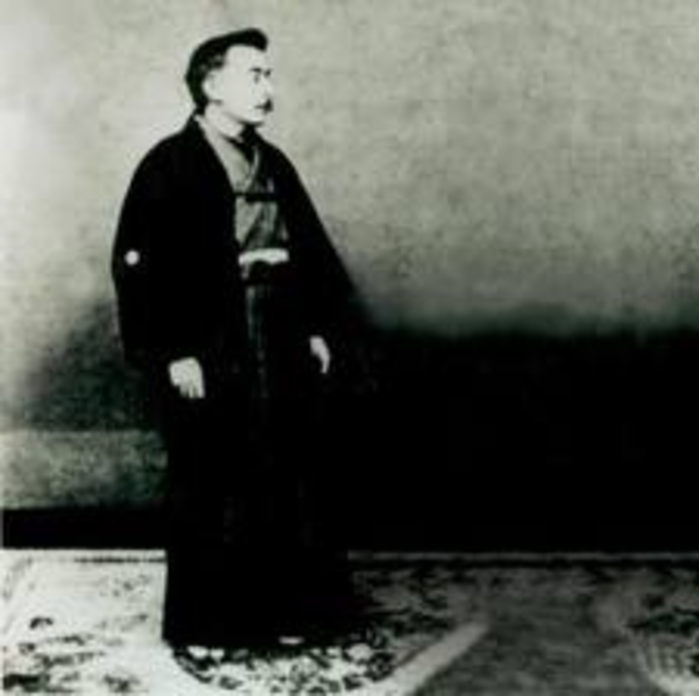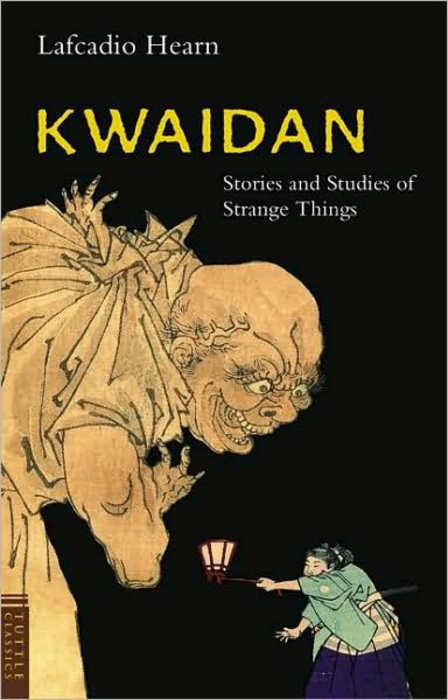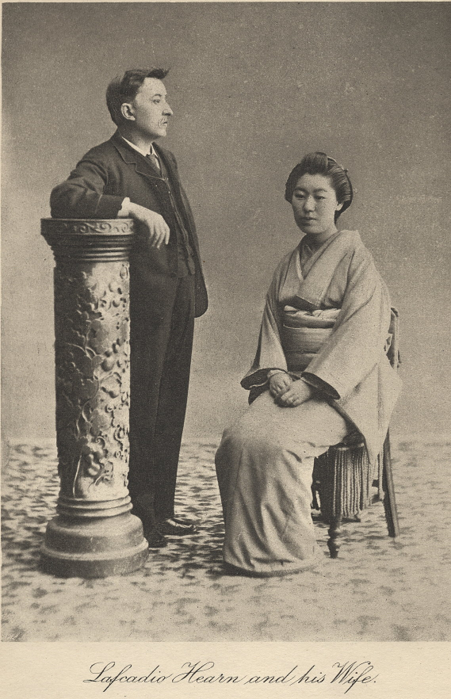The Dream of Lafcadio Hearn
Roger Pulvers
Roger Pulvers’ novel The Dream of Lafcadio Hearn brings to life the encounter of the Greek-Irish expatriate journalist-writer with Japan and the Japanese. Arriving in Japan in 1890 after twenty years in the United States, Patrick Lafcadio Hearn (Koizumi Yakumo) (小泉八雲)’s fourteen-year immersion in Japanese life provided the basis for a series of books that established him as the most influential interpreter of Japan in the West. But what Japan? The novel brings out the clash between Hearn’s idealized vision of a society rooted in ancient lore of the grotesque, the macabre and the quaint, and the thrust of industrialization and war that was transforming a rising imperial power. Drawing on his experience of immersion in Japanese literary, theatrical and filmic life for much of the last forty years, Pulvers limns the extraordinary life and times of Lafcadio Hearn. The following introduces readers to Hearn’s biography and an excerpt of the novel. Mark Selden
The following excerpt from the introduction to The Dream of Lafcadio Hearn deals with Hearn’s life. A selection from the novel follows.
He came to Japan at a time when the Japanese were eagerly embracing the West in all its industrial and imperialistic trappings (although rejecting its monotheistic religion). This gives rise to the essential paradox of Lafcadio Hearn: He became the interpreter of a Japanese soul that the Japanese themselves were loath to expose or recognize until, once safely modernized, they could take it up again and rediscover him as the emperor of their bruised nostalgia.
Lafcadio Hearn was born on June 27, 1850 on the Greek island of Lefkas, one of the Ionian Islands that were, from 1815 until 1864, occupied by the British Imperial Army Protectorate Forces. His father, Charles Bush Hearn, a staff surgeon in the British Army, was stationed temporarily on the island. Hearn’s mother was Rosa Kassimati, originally of Kythera. Hearn’s elder brother, George, died at age one, not two months after Hearn’s birth; and with Charles off at sea, the trauma for Rosa must have been considerable. The Hearn family of Dublin were well-to-do Protestant Irish, and it was to that city that Lafcadio was taken by his mother in 1852, when he was two years old.
Charles was soon dispatched to the West Indies, then later to the Crimea; and the couple eventually divorced . . . or, more precisely, the marriage was annulled on the grounds that Rosa had not signed the marriage certificate. Being functionally illiterate, needless to say, she hadn’t been able to. It is clear from recollections of Hearn’s relatives in Dublin that Rosa suffered from rather severe depression. One can imagine this woman, a native of Lefkas, the “Jewel of the Ionian Islands,” latitude 38 degrees, accustomed to warm sunny skies, thrust into the gloomy and damp atmosphere of Dublin, located a full 15 degrees north.
Ireland was just emerging, when she arrived there, from the Great Famine. Though the country had lost approximately one-quarter of its population through death and emigration, the population of Dublin had actually increased during the famine years of 1845–1852. Rosa, whose command of English was apparently minimal, must have suffered greatly. She returned to Greece pregnant, giving birth to another boy, James, in her home country in August 1854. Lafcadio never saw her again and never met his brother. (James, who emigrated to the United States in 1871, just two years after his elder brother, made an attempt to meet up with him, but the latter refused to see him.)
With no clear recollection of his mother and only fragments of memory of his father, who visited him in Dublin when he was little, Lafcadio was brought up by his great-aunt Sarah Brenane. She was a fervent convert to Catholicism, living in Rathmines,then and now a fashionable district of Dublin. She sent him off to a Catholic school in France, though it is unclear where exactly in France this was, and in 1863 to Ushaw College (also called St. Cuthbert’s College), a Roman Catholic school in County Durham, northeast England, where he remained until he was seventeen. It was there that Hearn lost his sight in one eye, apparently in a game called “Giant’s Stride,” in which a stick is swung on a rope around a pole. Whether this was a true accident, one cannot know. It was also at school in England that Hearn started to build his muscles, a defense against the isolation and estrangement he increasingly felt. Hearn’s mistrust of the church and disdain for missionaries that were to become so blatant in Japan no doubt had their origins here and at his Catholic school in France.
At school in England, where he was deeply unhappy, he endured, in addition to the austere and doctrinaire training by stern schoolmasters, the most conventional bullying by his peers. That “Paddy” (as Irish males were wont to be called by the English) took refuge in two things that would later stand him in good stead was understandable, those two things being his physical prowess and his refractive imagination. As an adult, he stood just 160 cm high, but his well-developed muscles, timidity’s armor, protected him. He was painfully introverted, and the deforming loss of sight in one eye only exacerbated his shyness. In particular, he came to feel that no woman of his own kind would look favorably on him, with his exophthalmic stare and his gloomy perception of the twisted realities of human nature.
After his great-aunt fell on hard times, Hearn was forced to leave school and travel to London, where he lived for a time with a maid who had once worked in the Dublin household. He detested London with a passion all his life, having experienced there only extreme indigence. Then, when he was nineteen, came the opportunity to go to America. He was sent away, actually fobbed off. By now his great-aunt was virtually destitute and could no longer cope with the burden of looking after her ward. She passed away two years later, in 1871.
Hearn set foot on Japanese soil for the first time at Yokohama on April 4, 1890. It is fair to say that he felt at home from the beginning.
Unlike virtually all other visitors to Japan from the West, he did not see himself as a preaching representative of a superior culture. He was in Japan to absorb its culture, not to sermonize his own. He threw himself into his new exotic garden with a genuine sense of wonder and discovery, setting out a patch for himself that other Westerners had little interest in, and then cultivating it with an intense passion.
He gravitated naturally, given his predilections, to the esoteric and mystical, introducing them as exemplary and representative. And as he observed, examined and wrote, he realized that he had finally found an identity for himself: Lafcadio Hearn—Chief Recorder of the Vanishing Japan.
As such, Hearn established a pattern of writing about Japan that lasted a century. A host of Western writers on the life of the Japanese continued in the Hearnian tradition, bewailing to their readers, and to any Japanese people who would listen, the tragic loss of all things good, quaint, mysterious, odd, macabre and “Japanese.”
|
|
Thanks to the good offices of Prof. Basil Hall Chamberlain of Tokyo Imperial University (now the University of Tokyo), who was to help him get a position some six years later in Tokyo as well, Hearn landed a job teaching English at a middle school in the town of Matsue, arriving there for the autumn term that began in September 1890. Though he spent only about a year there as a teacher, he has been associated with this town on the Sea of Japan coast ever since. In a way this makes sense, for it was in Matsue that he first delved into those areas of religious practice, provincial custom and folklore that were to form the vantage points of his outlook on Japan.
|
With Koizumi Setsu |
His view of Japan was set in its mold there, changing in the future only in the variety of its glazes. In Matsue he cast himself as a collector of miscellany, the same kind of transcriber of local mentalities that he had been in America. He was drawn to everything that the Japanese were tossing away, countless bits of information on cultural mores and religious ritual, from the gestures of Bon dances, Buddhist festivals, and pipe stems for males and females to the number of flickers made by an excited Japanese firefly. He was interested in ceremonial food, dress, poetry, music, the geisha, philosophy, flora and fauna, suicide, the Japanese smile, the Japanese tear, the Japanese sigh. Name a field of study of traditional art or life and Lafcadio Hearn was intrigued by it, swept away by it. He is the founding father of the school of Japanese uniqueness, the fountain that provides the spiritual and esthetic nourishment, flowing whenever turned on, that Japanese people required to convince themselves that they were more than the sum of their borrowed and mechanically transformed parts.
FOLLOWING IS AN EXCERPT FROM “THE DREAM OF LAFCADIO HEARN.” In this part, Hearn has gone to Osaka in search of Yone, whom he had met some years earlier in Matsue….
Some time later, I was walking along an unpaved side road in Osaka, in a district that the Americans would call the “back slums.” I passed a ramshackle building with a woman in ragged Occidental dress standing outside. Above the building’s door was a red sign in peeling paint that read … GLAND HOTEL.
I soon arrived at a nearby two-storey house after asking an old woman in the area the way. The house itself was an old one, but, judging from the shine of paint, the front window had obviously been covered in recent months with narrow crimson slats. I knocked twice on the front door and entered. The darkness inside was nearly total, and my eye could discern only the vague outline of a figure halfway along the hall.
“What do you want?” said the figure, a woman’s.
“Um, excuse me. I am sorry, but I am looking for a woman.”
“Nothing to be sorry about. If you had eyes you’d see them in front of you.”
With my eye slightly more accustomed to the darkness I could see that there were five or six women sitting in a circle in a small tatami-mat room near the entryway.
“Um, no, I am sorry,” I repeated. “I am looking for a … particular woman.”
The figure’s face gradually appeared in ever-increasing grey detail, before me a middle-aged and heavily made-up woman. She led me up a flight of stairs and along a corridor. She opened a door, releasing into the hall a rush of horridly foul air.
“In there,” she said. “And stop wincing.”
In the room there were about two dozen young girls, all fast asleep, large fetuses, their rounded sides neatly pushed against each other like birds in a poulterer’s window. I gave what must have seemed to the woman a helpless look, taking from my pocket a one-yen note and handing it to her.
“All right, just a minute, stay here,” she said, entering the room.
I watched as she stepped effortlessly over the bodies. She was now crouched in a corner, shaking the shoulders of one of the girls. The girl woke up abruptly and turned her face toward me. It was, for certain, Yone, Akira’s little sister. She must have been 20 by then, but she looked much older. I squinted my eye to see her more clearly and moved to one side in the doorway. The only light in the room came from the hallway.
I took Yone away from the house. Just as we reached a paved street, two soldiers in uniform turned a corner and came toward us. One of them spat at our feet. We had been walking without saying a word to each other. I was unable to speak. The foul odor of the room had remained in my nostrils. Yone was so sickly-looking and pale, I thought that she would faint away at the first exposure to light. It was she who broke the silence in a voice barely above a whisper.
“You are very sweet,” she said, smiling at me.
I was so moved by these words that I could only stare at her, my stubborn Cyclops eye awash, held tightly in its bag of hardened skin. I felt certain that this eye would burst its socket, fly off as if catapulted by rejecting muscle. Suddenly my head pounded with a severe pain, causing my eye to bulge even further from its lids.
“I … I … I have … I am now … a Japanese,” I finally managed to eke out.
She did not seem to understand this. Yet it did not affect the smile on her lips. I suppose that from our few encounters in Matsue, at the temple and the hospital, she had resigned herself to puzzlement over my personality. I like that about the Japanese. They never require explanations for those things which people cannot fathom. Caucasians, on the other hand, go from explanation to explanation, embracing theories until a newer one seems more tenable than the last. We condemn the past and are born once again into a new present, never realizing that all that went before is as much an integral part of the new self as ever. The Japanese attach trait to trait, the total always being accepted into the present.
I pulled Yone’s hand sharply, and she lurched forward. This gesture alone instantly cured my headache and I smiled her smile back to her. I led her along the street as fast as she could go, with passers-by unable to ignore us or hide their most disapproving expressions. There was only one part of the city of Osaka that I knew from my studies, the place where the warehouses and wholesale dealers of cloth were located. We came to a likely building in that area … a long barrack-like structure with an elegant white facade and wide grey slats over the windows … and entered the open door.
Inside was a bustle of activity such as I had never before seen in my life in any country. Hundreds of men of all ages were engaged in inspecting, rolling and carrying bolts of cloth or simply running about. Thousands of rolls of fabric of every color in man’s imagination were stacked along the walls of the cavernous space. Some men, no doubt the accountants and managers, sat in tatami-matted areas set off by little wooden screens. Those that I could see were rapidly fingering the beads of their abacuses. A few elegantly-dressed customers sat on the edge of the raised tatami-mat floor, as one man after another brought them rolls of silk to examine.
As Yone and I entered, one of the accountants or managers hollered “Welcome, welcome” to us, prompting virtually all of the hundreds of men in the warehouse to repeat the greeting in unison. Yone flushed a bright red. I put my hand against her cheek.
I asked to be shown their most delicate and lovely fabric fit for a girl of 20. One of the managers snapped orders in the direction of some young salesmen.
“Yes, sir, as you say, sir,” replied the salesmen, again in unison, running off toward one of the walls. They returned with a single bolt of cloth. Yone watched as the cloth was unrolled before her. I did not take my eye off of her. The fabric was gold, with a picture in silver and orange thread of sparrows on a twisted branch adorned in plum blossom buds.
“Do you like this one?” I asked her.
She merely nodded her head once, gazing off to one side, as if afraid to look me in the eye.
“I’ll take this one. Have a kimono made for her and sent to her address.”
“Thank you for your kindness, sir,” said the manager loudly.
Hearing the words “thank you,” every single man in that warehouse stopped what he was doing, turned toward Yone and me and shouted, “Thank you very much!”
After taking Yone to supper at a restaurant, I delivered her back to where she was staying. We stood at the door, once again unable to speak. She bowed to me and I bowed back.
“Oh, I forgot to ask you,” I said. “How is Akira, your brother?”
Yone opened the door, speaking with her hand resting on the doorknob.
“I do not know. I do not hear from him anymore.”
I stood at the closed door for some minutes, noticing for the first time that it was night. A little boy came running down the dirt road. After he had passed me by, without turning around, he screamed, “Foreigner! Foreigner!”
I did not recall the train trip back to Kobe, nor the reason why that memory, too, has eluded me. It must be because I detest trains so thoroughly.
Roger Pulvers is an American-born Australian author, playwright, theatre director and translator living in Japan. He has published 40 books in Japanese and English and, in 2008, was the recipient of the Miyazawa Kenji Prize. In 2009 he was awarded Best Script Prize at the Teheran International Film Festival for “Ashita e no Yuigon.” He is the translator of Kenji Miyazawa, Strong in the Rain: Selected Poems. The Dream of Lafcadio Hearn is his most recent book.He will speak in London on October 24, sponsored by The Japan Society, on “The Dream of Lafcadio Hearn: How did this Greek-Irishman conquer Japan?”
Recommended citation: Roger Pulvers, The Dream of Lafcadio Hearn, The Asia-Pacific Journal Vol 9, Issue 15 No 3, April 11, 2011.





